Abstract
OBJECTIVE: A combination herbal product containing American ginseng extract, Panax quinquefolium, (200 mg) and Ginkgo biloba extract (50 mg) (AD-FX; CV Technologies, Edmonton, Alta.) was tested for its ability to improve the symptoms of attention-deficit hyperactivity disorder (ADHD). DESIGN: Open study. PATIENTS: 36 children ranging in age from 3 to 17 years who fit the diagnostic criteria for ADHD. INTERVENTIONS: AD-FX capsules were taken twice a day on an empty stomach for 4 weeks. Patients were instructed not to change any other medications during the study. OUTCOME MEASURES: At the beginning of the study, after 2 weeks, and then at the end of the 4-week trial, parents completed the Conners' Parent Rating Scale--revised, long version, a questionnaire that assesses a broad range of problem behaviours (and was used as an indication of ADHD symptom severity). RESULTS: After 2 weeks of treatment, the proportion of the subjects exhibiting improvement (i.e., decrease in T-score of at least 5 points) ranged from 31% for the anxious-shy attribute to 67% for the psychosomatic attribute. After 4 weeks of treatment, the proportion of subjects exhibiting improvement ranged from 44% for the social problems attribute to 74% for the Conners' ADHD index and the DSM-IV hyperactive-impulsive attribute. Five (14%) of 36 subjects reported adverse events, only 2 of which were considered related to the study medication. CONCLUSIONS: These preliminary results suggest AD-FX treatment may improve symptoms of ADHD and should encourage further research on the use of ginseng and Ginkgo biloba extracts to treat ADHD symptoms.
Full text
PDF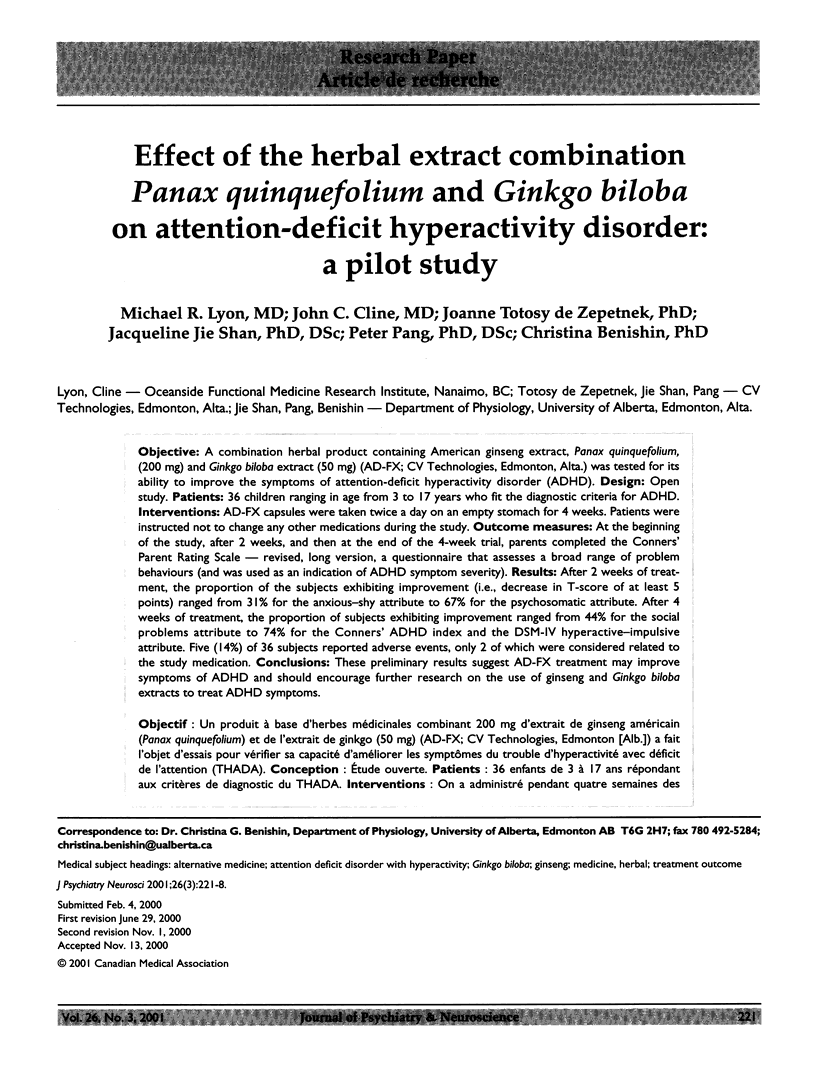
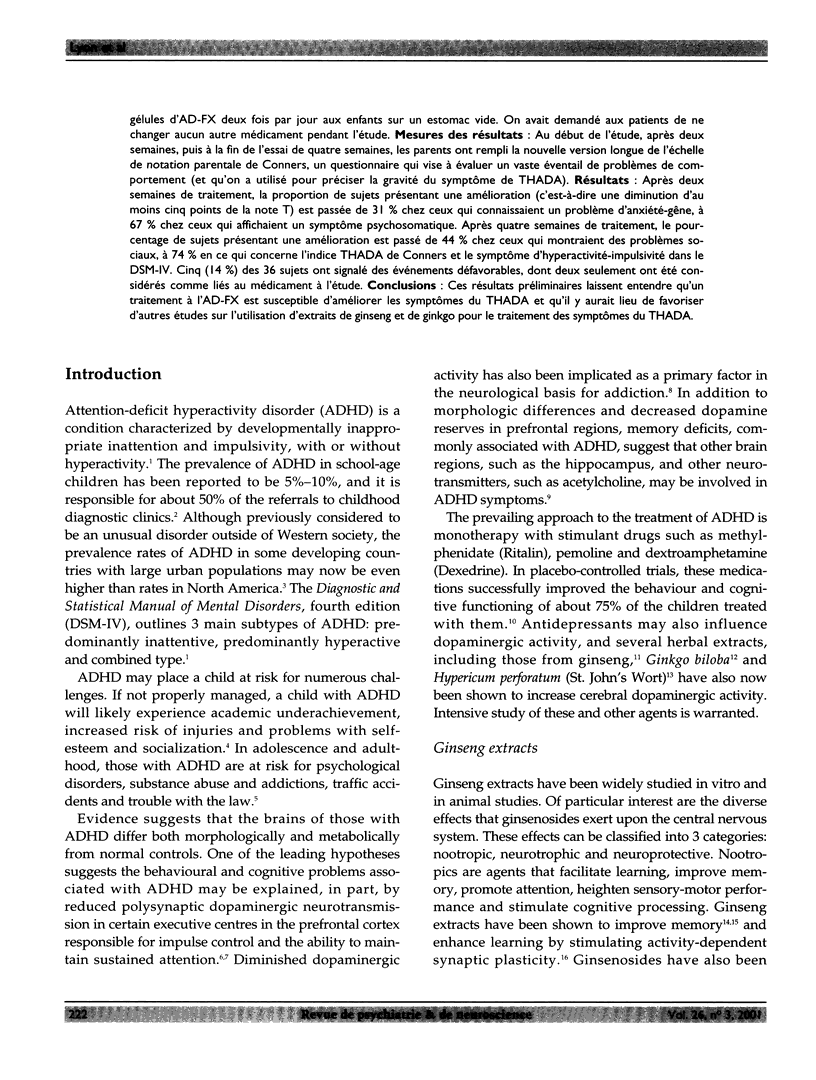
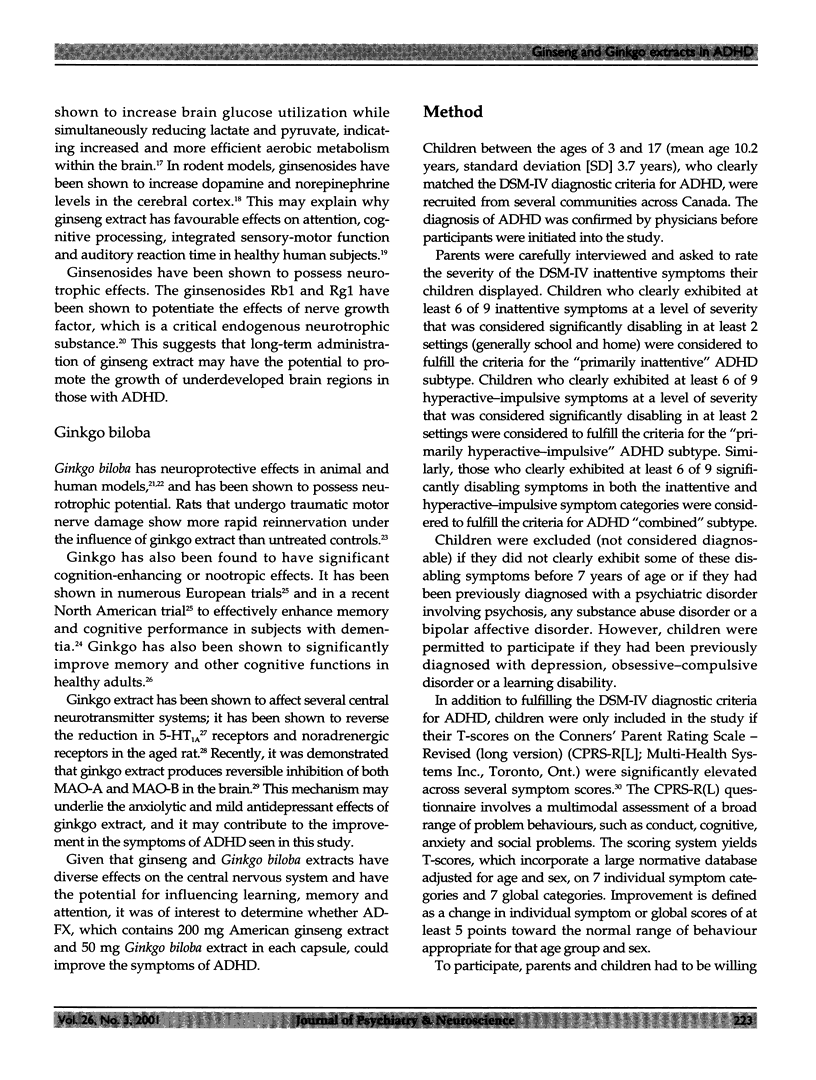
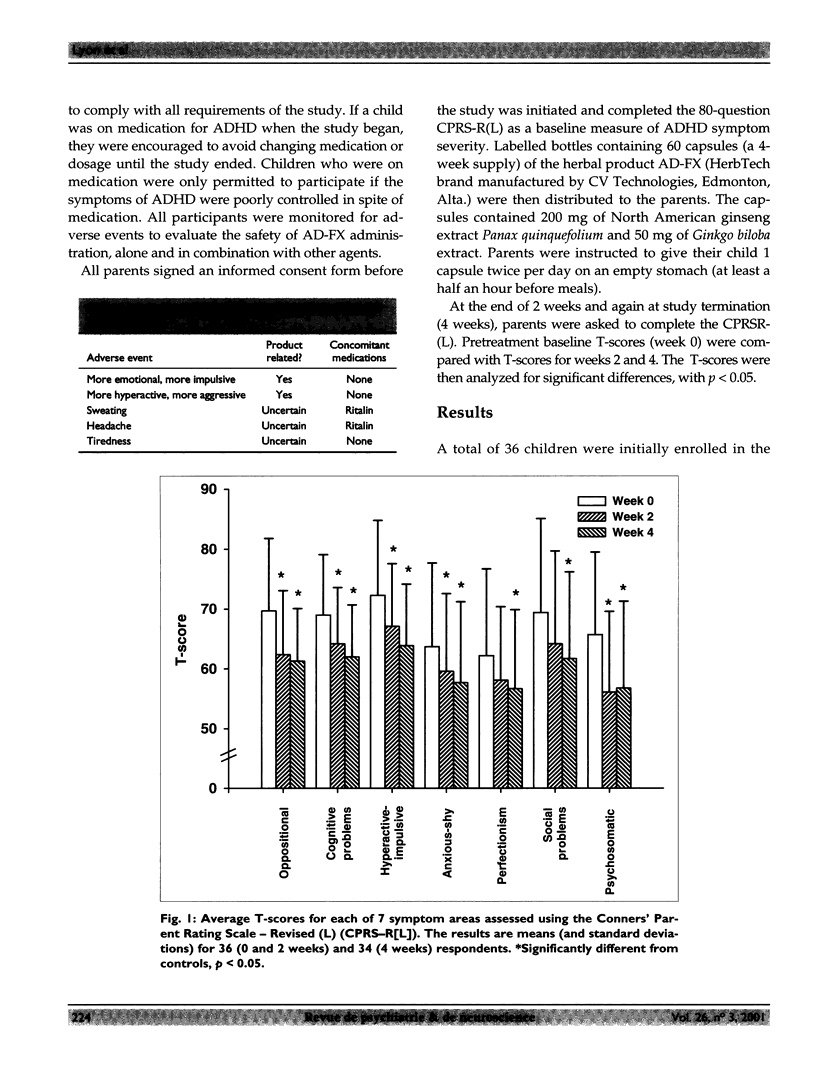
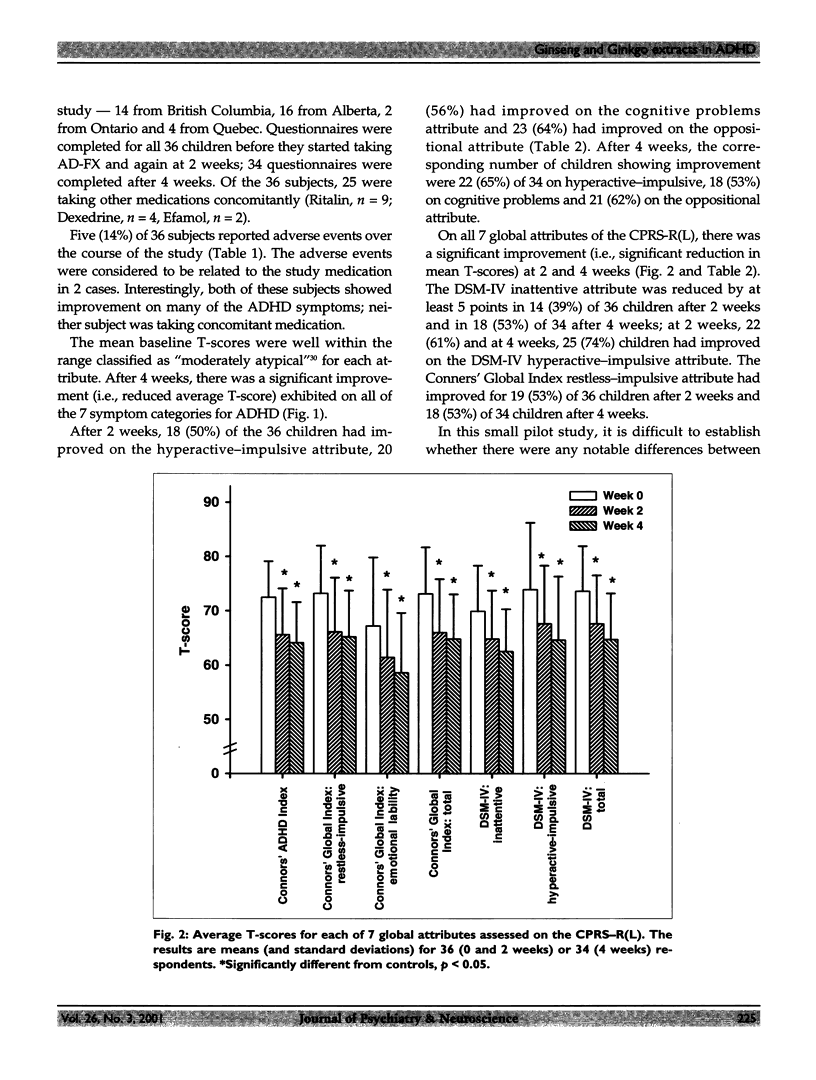
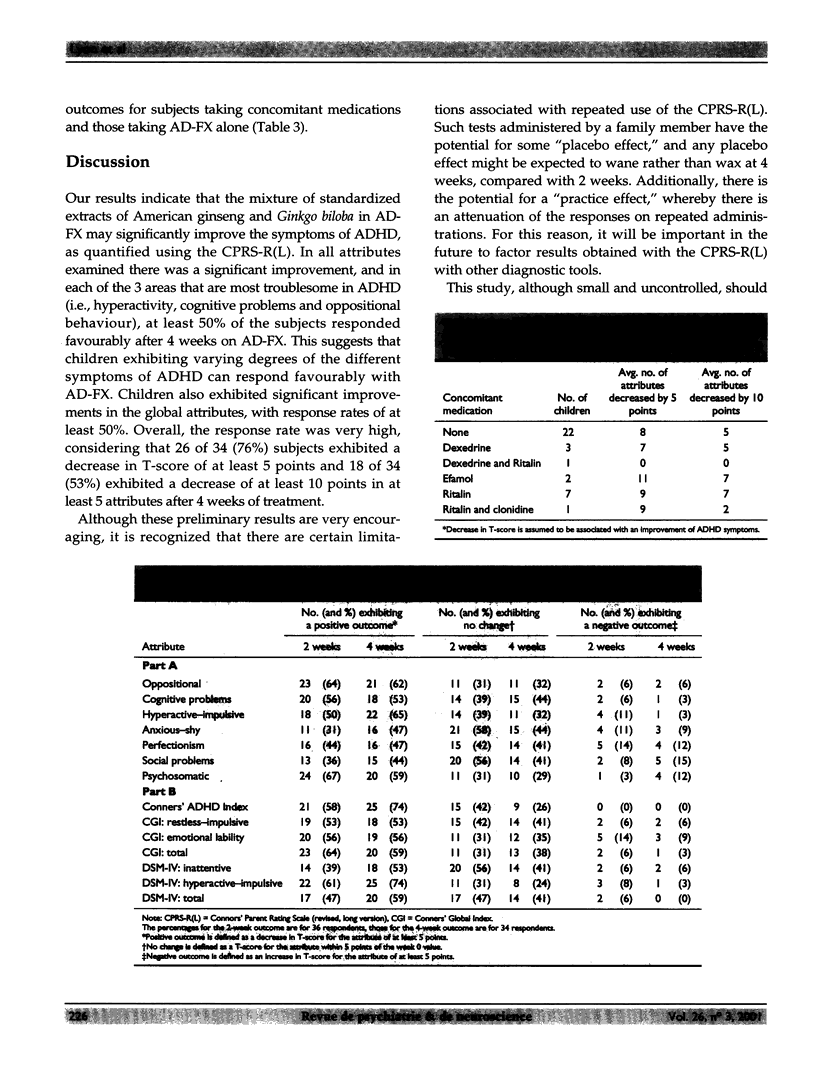
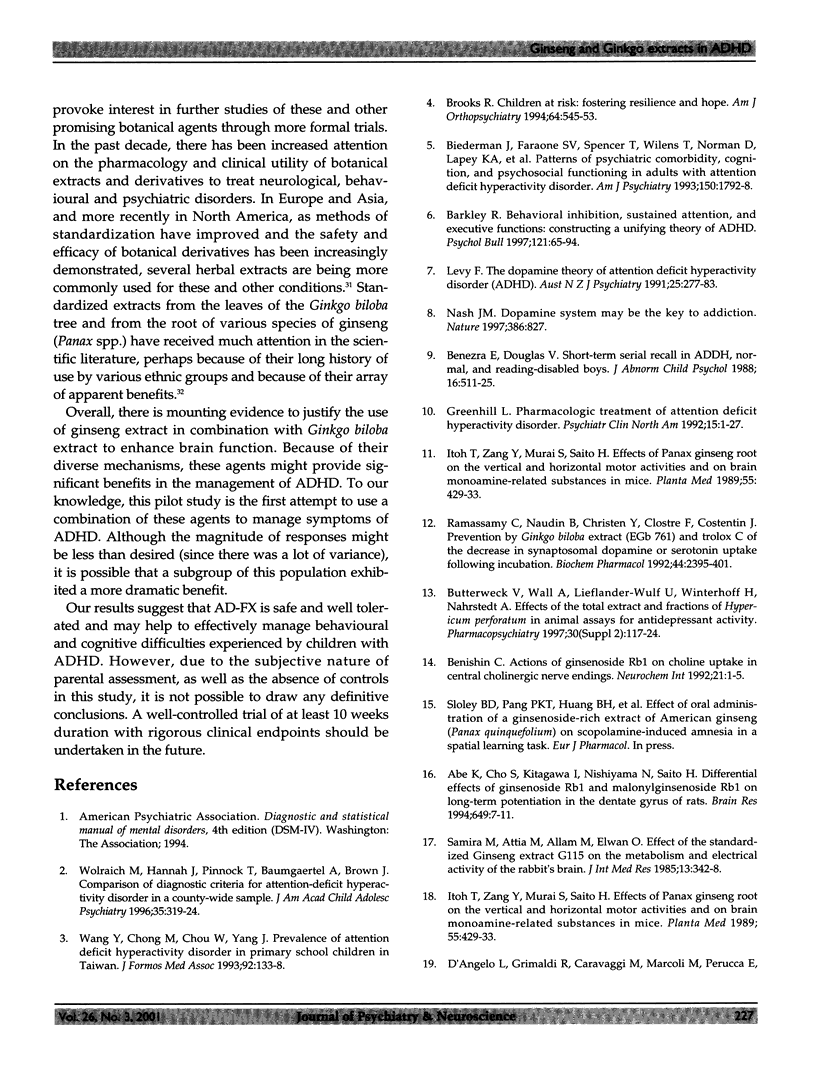
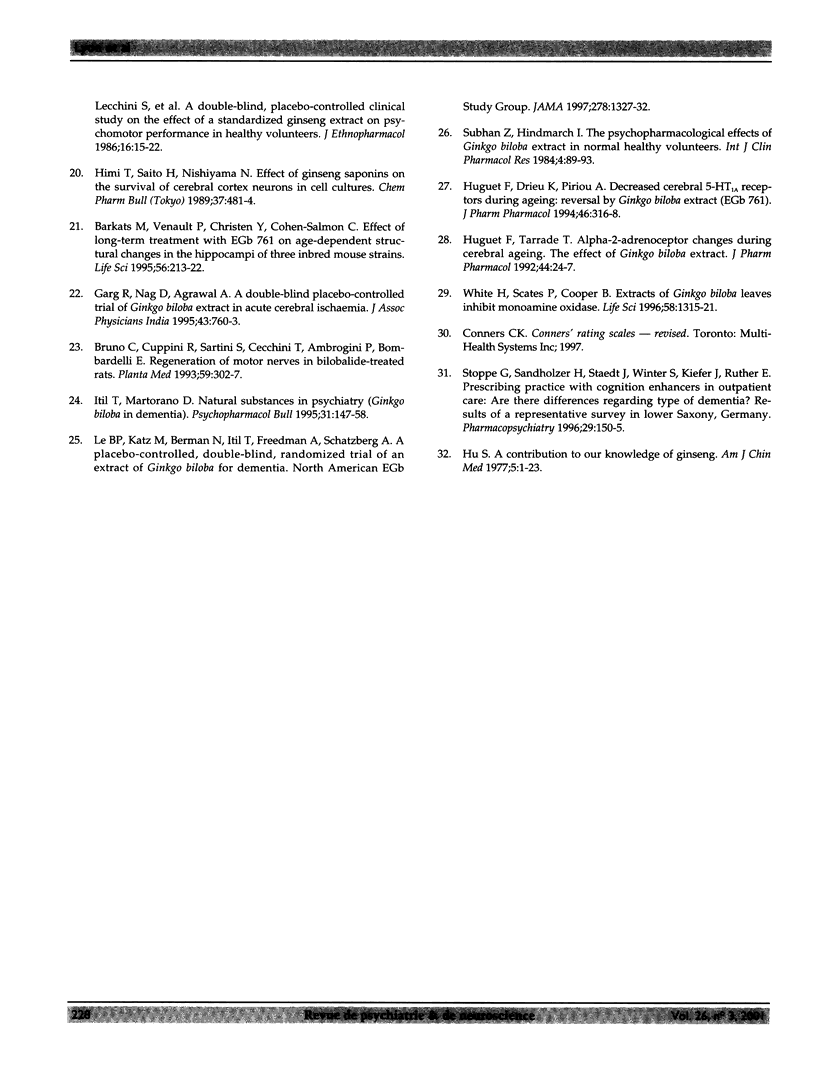
Selected References
These references are in PubMed. This may not be the complete list of references from this article.
- Abe K., Cho S. I., Kitagawa I., Nishiyama N., Saito H. Differential effects of ginsenoside Rb1 and malonylginsenoside Rb1 on long-term potentiation in the dentate gyrus of rats. Brain Res. 1994 Jun 27;649(1-2):7–11. doi: 10.1016/0006-8993(94)91042-1. [DOI] [PubMed] [Google Scholar]
- Barkats M., Venault P., Christen Y., Cohen-Salmon C. Effect of long-term treatment with EGb 761 on age-dependent structural changes in the hippocampi of three inbred mouse strains. Life Sci. 1995;56(4):213–222. doi: 10.1016/0024-3205(94)00915-5. [DOI] [PubMed] [Google Scholar]
- Barkley R. A. Behavioral inhibition, sustained attention, and executive functions: constructing a unifying theory of ADHD. Psychol Bull. 1997 Jan;121(1):65–94. doi: 10.1037/0033-2909.121.1.65. [DOI] [PubMed] [Google Scholar]
- Benezra E., Douglas V. I. Short-term serial recall in ADDH, normal, and reading-disabled boys. J Abnorm Child Psychol. 1988 Oct;16(5):511–525. doi: 10.1007/BF00914263. [DOI] [PubMed] [Google Scholar]
- Benishin C. G. Actions of ginsenoside Rb1 on choline uptake in central cholinergic nerve endings. Neurochem Int. 1992 Jul;21(1):1–5. doi: 10.1016/0197-0186(92)90061-u. [DOI] [PubMed] [Google Scholar]
- Biederman J., Faraone S. V., Spencer T., Wilens T., Norman D., Lapey K. A., Mick E., Lehman B. K., Doyle A. Patterns of psychiatric comorbidity, cognition, and psychosocial functioning in adults with attention deficit hyperactivity disorder. Am J Psychiatry. 1993 Dec;150(12):1792–1798. doi: 10.1176/ajp.150.12.1792. [DOI] [PubMed] [Google Scholar]
- Brooks R. B. Children at risk: fostering resilience and hope. Am J Orthopsychiatry. 1994 Oct;64(4):545–553. doi: 10.1037/h0079565. [DOI] [PubMed] [Google Scholar]
- Bruno C., Cuppini R., Sartini S., Cecchini T., Ambrogini P., Bombardelli E. Regeneration of motor nerves in bilobalide-treated rats. Planta Med. 1993 Aug;59(4):302–307. doi: 10.1055/s-2006-959686. [DOI] [PubMed] [Google Scholar]
- Butterweck V., Wall A., Liefländer-Wulf U., Winterhoff H., Nahrstedt A. Effects of the total extract and fractions of Hypericum perforatum in animal assays for antidepressant activity. Pharmacopsychiatry. 1997 Sep;30 (Suppl 2):117–124. doi: 10.1055/s-2007-979531. [DOI] [PubMed] [Google Scholar]
- D'Angelo L., Grimaldi R., Caravaggi M., Marcoli M., Perucca E., Lecchini S., Frigo G. M., Crema A. A double-blind, placebo-controlled clinical study on the effect of a standardized ginseng extract on psychomotor performance in healthy volunteers. J Ethnopharmacol. 1986 Apr-May;16(1):15–22. doi: 10.1016/0378-8741(86)90063-2. [DOI] [PubMed] [Google Scholar]
- Garg R. K., Nag D., Agrawal A. A double blind placebo controlled trial of ginkgo biloba extract in acute cerebral ischaemia. J Assoc Physicians India. 1995 Nov;43(11):760–763. [PubMed] [Google Scholar]
- Greenhill L. L. Pharmacologic treatment of attention deficit hyperactivity disorder. Psychiatr Clin North Am. 1992 Mar;15(1):1–27. [PubMed] [Google Scholar]
- Himi T., Saito H., Nishiyama N. Effect of ginseng saponins on the survival of cerebral cortex neurons in cell cultures. Chem Pharm Bull (Tokyo) 1989 Feb;37(2):481–484. doi: 10.1248/cpb.37.481. [DOI] [PubMed] [Google Scholar]
- Hu S. Y. A contribution to our knowledge of ginseng. Am J Chin Med (Gard City N Y) 1977 Spring;5(1):1–23. doi: 10.1142/s0192415x77000026. [DOI] [PubMed] [Google Scholar]
- Huguet F., Drieu K., Piriou A. Decreased cerebral 5-HT1A receptors during ageing: reversal by Ginkgo biloba extract (EGb 761). J Pharm Pharmacol. 1994 Apr;46(4):316–318. doi: 10.1111/j.2042-7158.1994.tb03802.x. [DOI] [PubMed] [Google Scholar]
- Huguet F., Tarrade T. Alpha 2-adrenoceptor changes during cerebral ageing. The effect of Ginkgo biloba extract. J Pharm Pharmacol. 1992 Jan;44(1):24–27. doi: 10.1111/j.2042-7158.1992.tb14357.x. [DOI] [PubMed] [Google Scholar]
- Itil T., Martorano D. Natural substances in psychiatry (Ginkgo biloba in dementia). Psychopharmacol Bull. 1995;31(1):147–158. [PubMed] [Google Scholar]
- Itoh T., Zang Y. F., Murai S., Saito H. Effects of Panax ginseng root on the vertical and horizontal motor activities and on brain monoamine-related substances in mice. Planta Med. 1989 Oct;55(5):429–433. doi: 10.1055/s-2006-962058. [DOI] [PubMed] [Google Scholar]
- Itoh T., Zang Y. F., Murai S., Saito H. Effects of Panax ginseng root on the vertical and horizontal motor activities and on brain monoamine-related substances in mice. Planta Med. 1989 Oct;55(5):429–433. doi: 10.1055/s-2006-962058. [DOI] [PubMed] [Google Scholar]
- Le Bars P. L., Katz M. M., Berman N., Itil T. M., Freedman A. M., Schatzberg A. F. A placebo-controlled, double-blind, randomized trial of an extract of Ginkgo biloba for dementia. North American EGb Study Group. JAMA. 1997 Oct 22;278(16):1327–1332. doi: 10.1001/jama.278.16.1327. [DOI] [PubMed] [Google Scholar]
- Levy F. The dopamine theory of attention deficit hyperactivity disorder (ADHD). Aust N Z J Psychiatry. 1991 Jun;25(2):277–283. doi: 10.3109/00048679109077746. [DOI] [PubMed] [Google Scholar]
- Ramassamy C., Naudin B., Christen Y., Clostre F., Costentin J. Prevention by Ginkgo biloba extract (EGb 761) and trolox C of the decrease in synaptosomal dopamine or serotonin uptake following incubation. Biochem Pharmacol. 1992 Dec 15;44(12):2395–2401. doi: 10.1016/0006-2952(92)90685-c. [DOI] [PubMed] [Google Scholar]
- Samira M. M., Attia M. A., Allam M., Elwan O. Effect of the standardized Ginseng Extract G115 on the metabolism and electrical activity of the rabbit's brain. J Int Med Res. 1985;13(6):342–348. doi: 10.1177/030006058501300608. [DOI] [PubMed] [Google Scholar]
- Stoppe G., Sandholzer H., Staedt J., Winter S., Kiefer J., Rüther E. Prescribing practice with cognition enhancers in outpatient care: are there differences regarding type of dementia?--Results of a representative survey in lower Saxony, Germany. Pharmacopsychiatry. 1996 Jul;29(4):150–155. doi: 10.1055/s-2007-979562. [DOI] [PubMed] [Google Scholar]
- Subhan Z., Hindmarch I. The psychopharmacological effects of Ginkgo biloba extract in normal healthy volunteers. Int J Clin Pharmacol Res. 1984;4(2):89–93. [PubMed] [Google Scholar]
- Volkow N. D., Wang G. J., Fischman M. W., Foltin R. W., Fowler J. S., Abumrad N. N., Vitkun S., Logan J., Gatley S. J., Pappas N. Relationship between subjective effects of cocaine and dopamine transporter occupancy. Nature. 1997 Apr 24;386(6627):827–830. doi: 10.1038/386827a0. [DOI] [PubMed] [Google Scholar]
- Wang Y. C., Chong M. Y., Chou W. J., Yang J. L. Prevalence of attention deficit hyperactivity disorder in primary school children in Taiwan. J Formos Med Assoc. 1993 Feb;92(2):133–138. [PubMed] [Google Scholar]
- White H. L., Scates P. W., Cooper B. R. Extracts of Ginkgo biloba leaves inhibit monoamine oxidase. Life Sci. 1996;58(16):1315–1321. doi: 10.1016/0024-3205(96)00097-5. [DOI] [PubMed] [Google Scholar]
- Wolraich M. L., Hannah J. N., Pinnock T. Y., Baumgaertel A., Brown J. Comparison of diagnostic criteria for attention-deficit hyperactivity disorder in a county-wide sample. J Am Acad Child Adolesc Psychiatry. 1996 Mar;35(3):319–324. doi: 10.1097/00004583-199603000-00013. [DOI] [PubMed] [Google Scholar]


